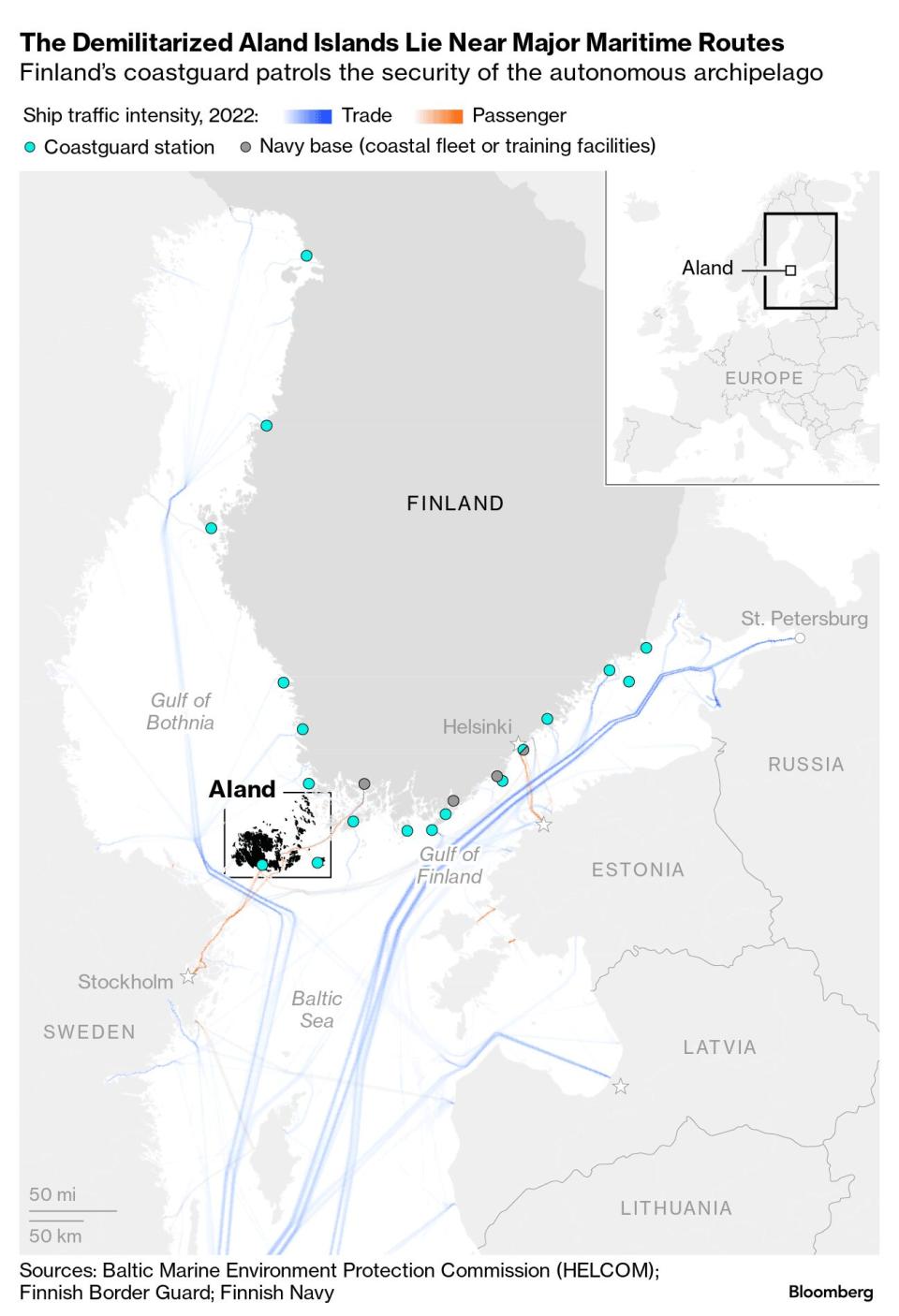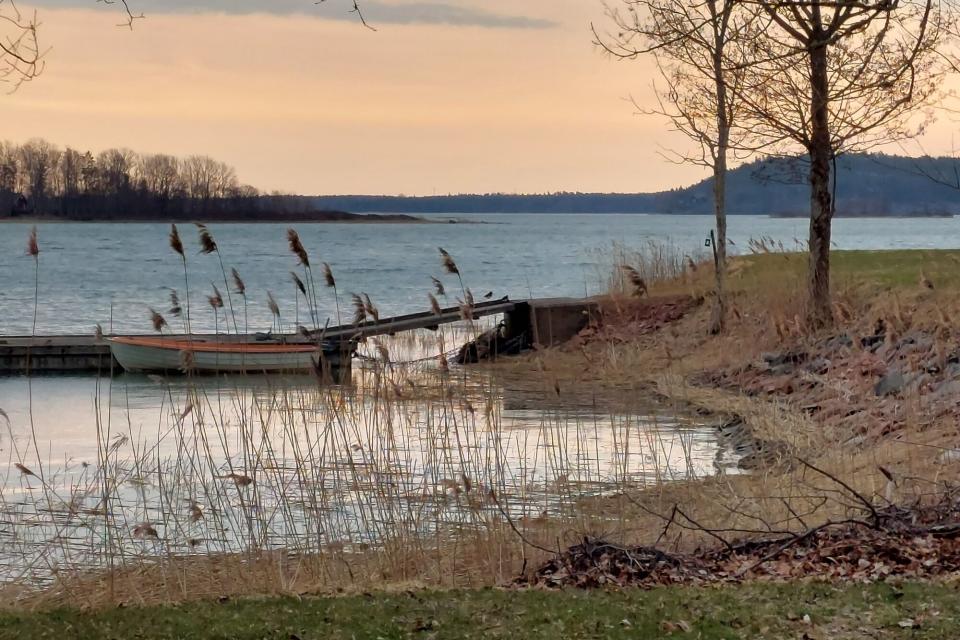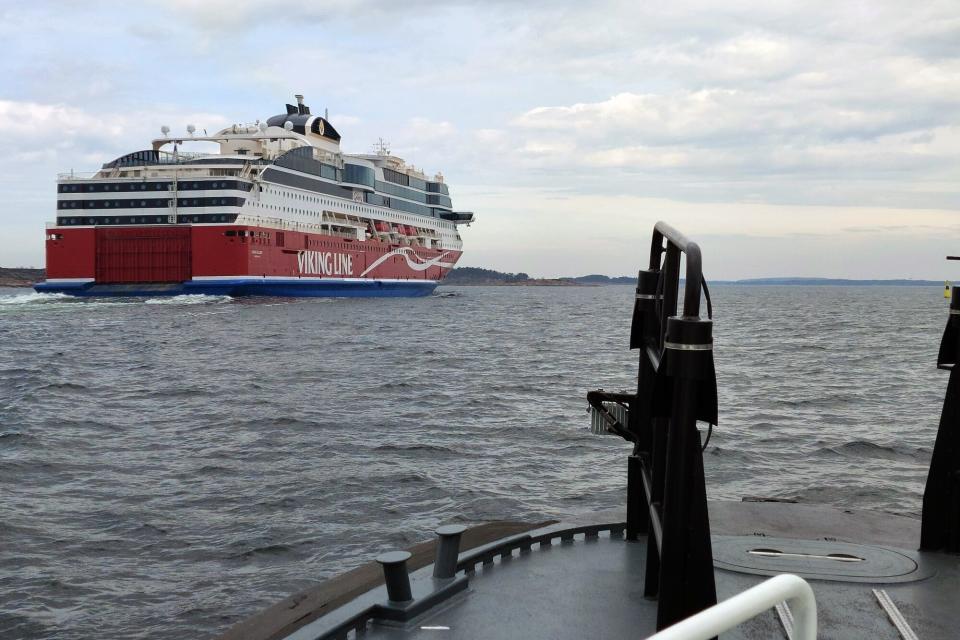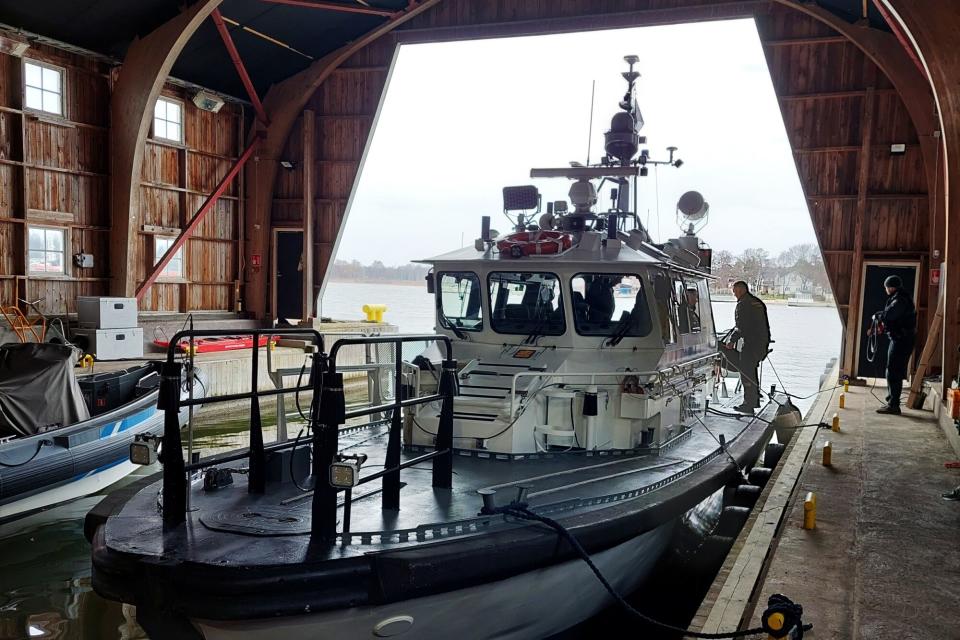Will ‘Finland’s Achilles Heel’ Become a Problem for Europe?
(Bloomberg) -- On a boat weaving through the Aland Islands in late April, coastguard officer Kim Westman was on the lookout for anything out of the ordinary.
Most Read from Bloomberg
Harvard Students Walk Out of Commencement Protesting Suspensions
Citi Trader Got 711 Warning Messages Before Sparking Flash Crash
US Justice Department to Seek Breakup of Live Nation-Ticketmaster
And like nearly every patrol since Russia’s invasion of Ukraine some two years ago, Westman found nothing of serious concern to report. But the serenity belies growing concerns over a crucial maritime gateway and shipping routes worth $160 billion a year.
The self-governing archipelago stretching across the middle of the Baltic Sea officially belongs to Finland, its residents speak Swedish, and Russia is tasked with enforcing an accord that has banned any military presence on its shores for over a century.
With Finland now a member of NATO and Russia jostling to assert its rights in the region, hawks say the unusual set up has become the Nordic country’s greatest vulnerability, giving Moscow an open field should it ever decide to invade.
Read More: Russia Pulls Notice of Baltic Sea Border Plan
“If you have all the Aland Islands, you can block maritime traffic both to the Gulf of Bothnia and to the Gulf of Finland,” said Pekka Toveri, a former major general in Finland’s armed forces and member of parliament for the center-right National Coalition Party, part of the ruling coalition. “Then we are pretty screwed.”
About 96% of Finland’s trade flows through sea lanes near Aland. The ability to send goods entirely by land, over the top of Norway or Sweden into Finland, is limited by harsh Arctic winters, poorly maintained roads and different rail gauges. The area is also home to key communication and energy infrastructure, including undersea electricity and internet cables.
Finland forged a careful coexistence with its eastern neighbor after fighting two wars against the Soviet Union in the 20th century. Its shift towards the west culminated in a break from non-alignment when Putin sent tanks to Ukraine. Eight out of nine nations on the Baltic Sea are now NATO members; only Russia is not.
The next step in strengthening defenses should be to close the Russian consulate on the Aland Islands and allow Finnish forces to train on them, according to Toveri. He said the archipelago is more important to Finland than Gotland Island is to Sweden — and the Swedish government remilitarized that island after Russia annexed Crimea in 2014, later re-introducing permanent troops, adding tanks and reactivating air defense systems.
Dismantling layers of international demilitarization agreements would be complex, though, and is unlikely for now. Recent polls suggest the 30,000 Aland residents see no great need to do so and the Finnish government recently reviewed the islands’ status, without concluding changes should be made.
Instead, the focus is on vigilance and contingency planning. Wille Rydman, Finland’s economy minister, said the country has prepared for scenarios ranging from an attempt by Russia to take control of the Baltic Sea, to more limited operations he declined to detail. They likely include acts of sabotage with plausible deniability aimed at testing NATO’s resolve.
There has already been an increase in jamming of satellite signals used by airlines, smartphones and weapons systems in the Baltic Sea that officials said have largely been traced to areas near the Russian city of St. Petersburg and its enclave Kaliningrad, wedged between Poland and Lithuania.
Jan Olav Hanses, chief executive of Viking Line Abp — which is based on Aland and is a major carrier of goods between Sweden and Finland — said he’s introducing back-up systems to restore critical services in case his fleet’s navigational systems are targeted next. “We need to be prepared,” Hanses said, adding that the company’s sales and bookings were disrupted for 24 hours following a cyber attack on its website in October and that the hackers identified themselves as Russian.
Later this month, shippers key to Finland’s security of supply, port operators and the National Emergency Supply Agency will practice using less optimal routes, as well as operating with reduced crews in the event seafarers are mobilized to serve with defense forces, according to Tiina Tuurnala, chief executive of the Finnish Shipowners’ Association.
Finland has already updated emergency legislation that allows the state to guarantee insurance for vital cargo, ships, aircraft and other vehicles that transport them, along with their crews. Insurance typically amounts to around 1% to 1.5% of the insured value of a vessel — Viking ships are worth as much as 200 million euros — and that percentage could run into the double-digits for war or conflict insurance, Hanses said.
Despite the assurances and all the planning, the native of Finland who has lived in Aland for more than 35 years, said his preference would still be for troops to be stationed on the islands.
Read more: Russian Sabotage, Spying and Intimidation Is Spreading in Europe
As Westman’s crew maneuvered their 13.5-meter (44 meter) boat through a gentle chop, they consulted electronic charts of some 6,800 islands and skerries that make up the archipelago. The Baltic Sea is shallow — one reason shipping routes are limited — and treacherous, with rapakivi granite jutting out of the water throughout the islands or lurking below the surface.
Perched on a dark green gurney inside the cabin, Westman said his team has a high “situational awareness” of all maritime traffic including cargo, crews, the origin and ownership of ships, along with the profiles of visitors who arrive on 25 passenger vessels each day.
Founded in 1930 to chase smugglers during Finnish prohibition, the coastguard provides security in the absence of a military presence on Aland.
Coming under the auspices of Finland’s Interior Ministry, its members carry sidearms and long guns. While they can’t have army-grade equipment, they practice using such weapons during military drills on the mainland.
The Aland Islands have been impacted by every war in the Baltics since 1741, according to Kenneth Gustavsson, a local military historian, three of which ended with major treaties that shaped the identity of its residents.
An initial demilitarization pact was signed in 1856 after the Crimean War. Swedish became the official language as a result of protections won from the League of Nations following World War I, in an agreement that also granted sovereignty to Finland. Two decades later, the Soviet-Finland accord allowed the then-USSR to open a consulate and monitor the islands.
With those arrangements now under pressure, Alanders have found a way to express their displeasure with Russia while simultaneously demonstrating their commitment to peace.
Every day since Moscow’s invasion of Ukraine, a small group of protesters gathers outside Russia’s consulate in the capital, Mariehamn at precisely 5 p.m. Standing on the boulevard opposite the building — next to a Ukrainian flag and a peace sign — they hold a moment of silence, sing and shout: “Putin to The Hague!”, a reference to the home of the international criminal court.
Then both sides return to their normal business, the consul free to travel the islands by boat and car with his wife to check Finland isn’t trying to smuggle in weapons or soldiers — though he’s been keeping a low profile recently, and declined to be interviewed.
Earlier this spring, one of the protest regulars, Ulf Grussner, a retired businessman in his eighties, was arrested and fined €900 ($978) for carrying a weapon without a permit after he took a WWI-era rifle, asked his artist granddaughter to tie a knot in the barrel, and placed it outside the consul where it remained for more than a week before it was confiscated by police.
Grussner doesn’t want the consulate closed, reasoning: “It is better to see your enemy in his eyes and talk to him than to wonder where he is and what he is going to do.” And he says he feels safe because in the event of an Ukraine-type attack, the Finnish military would be legally obligated to defend the islands. Finland’s government could also invoke NATO’s collective defense pledge known as Article 5.
When Grussner’s rifle — a mini replica of the nonviolence sculpture outside the United Nations building in New York — is released by police, a local museum has asked to exhibit it.
“I wouldn’t say that we are afraid, but we are alert,” said Aland government leader Katrin Sjogren when asked about resistance to remilitarizing. She added, “At times like these, it becomes more important than ever to look for solutions that push the pendulum back toward peace.”
Constructed for trade after the Crimean War, it would be hard to invent a town more suited to that ideal than Mariehamn.
The beauty of its deep-water port is enhanced by tidy streets and paths that wend between beaches, wildflowers and linden trees. Cyclists glide past ponds where barnacle geese sun themselves on tiny islands topped with red-painted houses.
The local economy is fishing and agriculture, as well as trade and tourism. The Aland Islands are known for being a tax-exempt passage for ferries going to and from Sweden, where passengers can stock up on cheaper alcohol and tobacco without even getting off the boat, though many choose to.
Beyond wanting to maintain an idyllic existence — and worrying about the consequences of picking a fight with Russia — Alanders fear that pulling on the demilitarization thread would unravel the other agreements that guarantee their language and cultural rights.
In tense situations, the web of treaties that keeps everyone in check is crucial, said Susann Simolin, director of the Aland Islands Peace Institute. “Aland is one piece in a much larger puzzle,” she said.
On the boat, Westman stressed that if needed the coastguard can scale up their numbers “very flexibly and very fast’’ with other members of the some 3,100-strong border force, which includes civilians. But he speculated that it might not be in Russia’s interest to push the threat level too high because it benefits from demilitarization.
The reason? “Should they ever want to perform a military action,” he said, “then it surely would be easier if this was not already occupied by other military personnel.”
--With assistance from Demetrios Pogkas.
Most Read from Bloomberg Businessweek
The Dodgers Mogul and the Indian Infrastructure Giant That Wasn’t
A Hidden Variable in the Presidential Race: Fears of ‘Trump Forever’
©2024 Bloomberg L.P.

 Yahoo News
Yahoo News 




